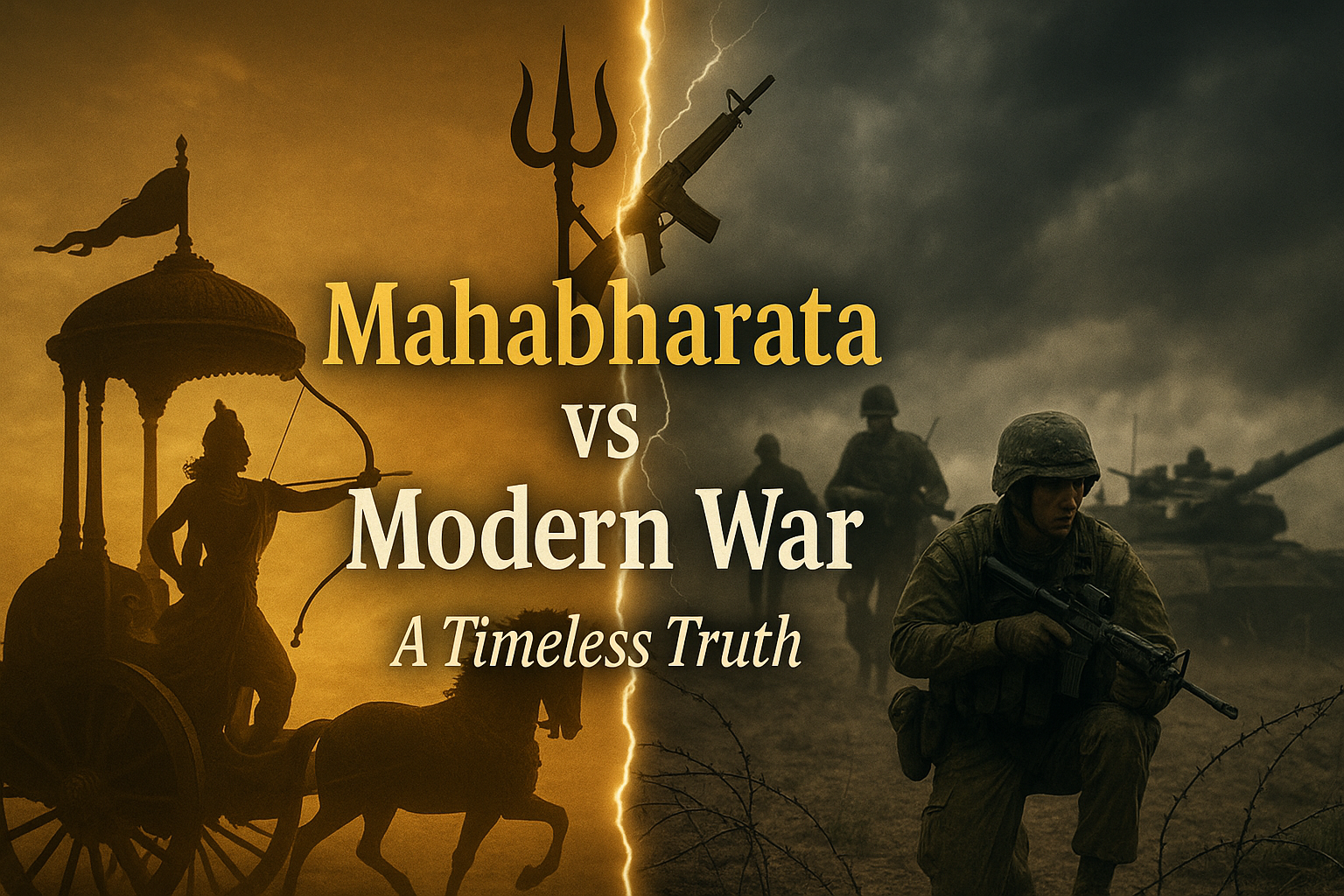Mahabharata and the Modern Battlefield: A Timeless Truth

Ancient dharma meets modern diplomacy in the face of relentless provocation.
Today, in the times of war and conflict, many of us are stuck in a dilemma, finding it difficult to choose between peace and war. These situations are not new to mankind. As we do today, our ancestors also faced these situations long before and emerged virtuous and victorious through them. Let's take a look at the Epic of Mahabharata.
Mahabharat Udhyog Parva: Bhagwat Yana
न तु मन्ये स तद् वाच्यो यद् युधिष्ठिरशासनम् ।
उक्तं प्रयोजनं यत् तु धर्मराजेन भारत ।। १० ।।
तथा पापस्तु तत् सर्वं न करिष्यति कौरवः ।
तस्मिंश्चाक्रियमाणेऽसौ लोके वध्यो भविष्यति ।। ११ ।।
मम चापि स वध्यो हि जगतश्चापि भारत ।
येन कौमारके यूयं सर्वे विप्रकृताः सदा ।। १२ ।।
विप्रलुप्तं च वो राज्यं नृशंसेन दुरात्मना ।
न चोपशाम्यते पापः श्रियं दृष्ट्वा युधिष्ठिरे ।। १३
यच्चापि परमं दिव्यं तच्चाप्यनुगतं त्वया ।
विधानं विहितं पार्थ कथं शर्म भवेत् परैः ।। १७ ।।
Bhagwan Krishna describes Duryodhan as wicked-minded and reminds Arjuna of his evil deeds.
He explains that nothing but death awaits Duryodhan if he refuses to comply.
He reminds Arjuna what the cherished intentions of Duryodhana are, he reminds them of how Duryodhana in the past made multiple failed attempts to persecute Pandavas and even after being forgiven multiple times, he refuses to give up the sinful path.
He concluded by saying, “How then, O Parth, can peace be concluded with foe? Do not expect peace to be possible with."
Today, we find India in a similar situation. Even after multiple wars, retaliations and attempts to make peace, Pakistan still refuses to give up the sinful act of terrorism.
How can peace be concluded with a foe who refuses to learn from its past?
सर्वथा तु मया कार्यं धर्मराजस्य शासनम् ।
विभाव्यं तस्य भूयश्च कर्म पापं दुरात्मनः ।। २१ ।।
He later says that if peace is made with such evil, then he will have to think about what other ways in which such evil can be made to repent for his sins.
Mahabharat Udhyog Parva: Bhagwat Yana (continued)
न चापि ह्यकरोद् वाक्यं श्रुत्वा कृष्ण सुयोधनः ।
युधिष्ठिरस्य दाशार्ह श्रीमतः संधिमिच्छतः ।। ९ ।।
साम्ना दानेन वा कृष्ण ये न शाम्यन्ति शत्रवः ।
योक्तव्यस्तेषु दण्डः स्वाज्जीवितं परिरक्षता ।। १३ ।।
क्षत्रियेण हि हन्तव्यः क्षत्रियो लोभमास्थितः ।
अक्षत्रियो वा दाशार्ह स्वधर्ममनुतिष्ठता ।। १६ ।।
Here, Draupadi says even after she suffered from such insults in front of the whole court, they still made an attempt to make peace, settling with five villages instead of the empire.
But Duryodhan still refused to comply with the peace proposal.
She further says there is no need to make peace if Duryodhana agrees to make peace without giving the bare minimum of five villages.
In the second verse, she says, “Those enemies, O Krishna, with whom peace cannot be established by either conciliation or presents, should be treated with severity by one desirous of saving his life."
If one values his life, he should eliminate the enemies with whom peace cannot be established.
She also says that a warrior who cannot fulfil his duties had better be slain.
The same logic can be applied to the current context. Trying to make peace with one who does not desire peace is not worth it, and what will be the value of such peace, in which Pakistan gets away without giving anything (extradition of terrorists, POK, etc)?
न हि सर्वे सुखं प्राप्य दुःखं वा तु न कदाचन।
दुर्योधनस्य पापस्य कारणं सञ्जयवर्धनम् ॥
In the Mahabharat, Bhagwan Krishna tells Yudhishthir that the responsibility for the innocent lives lost in the Yudh does not fall on him, but on Duryodhan.
Duryodhan's refusal to make peace and his pride led to the war.
Bhagwan Krishna tells Yudhishthir that he is not to blame because he always tried for peace.
The lesson here is that sometimes, even if we try to avoid conflict, the actions of others can lead to situations we can't control.
धर्मेणैव हि युद्धानि यानि सन्ति महात्मनाम्।
न तेषां विद्यते पापं येषां धर्मः परायणम्॥
Wars fought by noble souls in accordance with dharma do not lead to sin; for those whose refuge is dharma, there is no sin.
Even though the times have changed, circumstances remain the same.
The place of Duryodhan within a family is taken by Evil Pakistan within the subcontinent, continuing the spread of adharma.
And ancient knowledge of ancestors still continues to guide us even today.